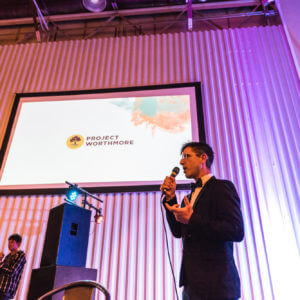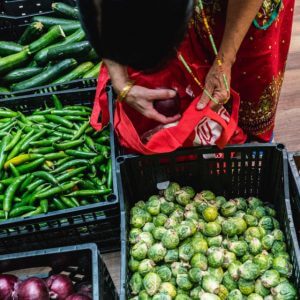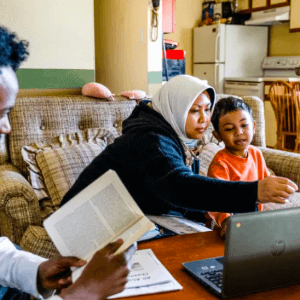We begin with introductions. We state our names, where we come from, and how long we’ve been in Denver, always careful to emphasize proper English structures. Contractions, idioms, phrasal verbs, all of these are carefully extracted from our speech. The volunteers and teachers, including myself, distill endless amounts of nuance and data into simple sentences. “My name is”. “I am from”. The students mimic as best they can, a variety of accents lending a rainbow of tones to the sound.
Matched is the diversity of clothing, the bright colors of traditional fabrics mixed in with faded Walmart t-shirts. A woman nurses an infant as she speaks, another older child grasping at her breast. Some, long-time attendees, breeze through the exercise and end their “nice to meet you” with a triumphant smile. Others, new not just to the class but to English itself, must be carefully led through the exercise, a teacher repeating for them each and every word. We can only hope that by filling in their sentences with names, countries, and years, they will be able to understand the meaning of the words we are unable to explain to them in the native tongues they’ve been forced to leave behind.
We the teachers are of course not the only ones distilling our life experiences into simple sentences. There is an indescribable magnitude in hearing someone utter, “I am from Syria.” I find myself immediately looking to their eyes, their hands, as if I could read something of the story they don’t yet know how to tell. (Or perhaps better to say, I do not yet know how to understand).
After the exercise we greet each student warmly, congratulate them on a successful English sentence, and often I find my encouragement colored with something closer to awe. Because all of our students, ranging in age from teens to the very elderly, are refugees. Forced to leave their homes, often left to languish in poorly organized camps for years, bureaucracy and chance has finally led them of all places in the world to Denver, Colorado. (At no point, as many anti-refugee protestors misunderstand, did these people “choose” to come here.) With essentially no formal support, they must learn to live and work in an entirely foreign country. English language is only one of the many barriers they must overcome to reestablish their independence, and begin the perhaps unending process of rebuilding their lives.
Although I felt a genuine call to action in becoming a volunteer, my initial intent was also more selfish in nature. I wanted more classroom experience. But although I might have considered myself fairly informed about the crises in the Middle East and Southeast Asia, I was all the same unprepared for facing the sheer human tragedy of it all.
In a macabre sort of way, it’s like meeting a popstar face-to-face. “I come from the city of Baghdad.” “I come from Damascus.” These city names invoke the broadcasts from my small kitchen television growing up, the scan-lined images of endless pale desert, smoke rising in the distance, US tanks crawling through the dust. Death statistics, buildings as faded as the ground around them, collapsing back to it. In other cases, such as the country of Myanmar, I can only conjure a more Hollywood scene, dense greenery echoing with the sound of bullets, blood mixed into a rich black soil.
One quickly feels the ridiculousness of such conceptions. Instantly, the television headlines and political maps are brushed away and replaced with the faces and names of those you see calmly, sometimes nervously, sitting in classroom chairs. In sharing a table with a Syrian woman, I find the act of helping her learn English letters takes on an urgency—I want so badly for her to succeed.
Sometimes though, as I get to know the students and assume the more familiar role of teacher and encourager, I find my awareness of their past slipping to the back of my mind. But all too often this comes back in an instant. In one class a man’s phone went off loudly, and the student next to him flinched violently in alarm. He quickly calmed down, class continued without disruption. But I am unable, nor do I want, to forget how hard it was to watch such a display of trauma.
Before meeting these people and assisting in these classes, I could have honestly said that I had empathy for the human beings affected by war and political upheaval around the world. Of course I did. I shouldn’t have to meet every single mother who has lost a child to know that losing a child is devastating. But even so there is something so much more intense gained in sharing a room with the people whose entire lives are wrapped into the headlines we read over breakfast.
It is an experience I am deeply grateful for, but also one I immediately hope others can gain as well. I perhaps naively assume that most of my readers share sympathy and condemn the devastation taking place far away from us. But even if you find your fists clenching at every new piece of devastation, there is always a still greater depth of empathy.
Perhaps nothing compares to shaking the weathered hands of those who have faced the harshest obstacles life can present, and still sit down every week to eagerly, if slowly, learn the words that will unlock a new life.
Skye Savage is an English Language Program teacher and former volunteer of Project Worthmore


